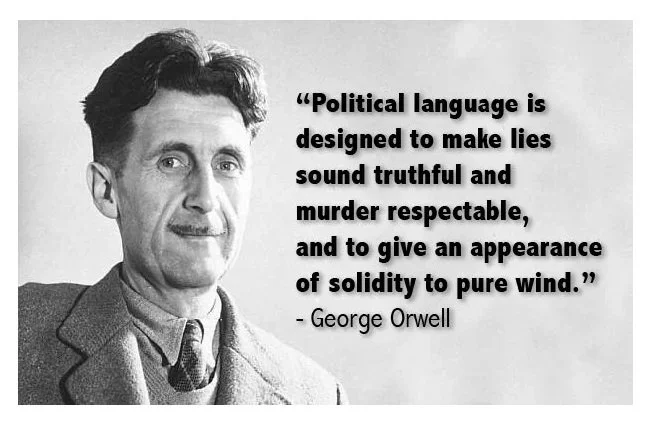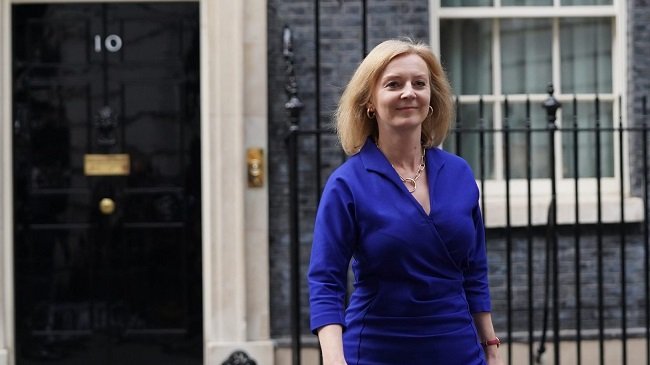Ambiguous Language
I have both a love and fascination for the English language. I enjoy both its formality and informality, its diversity, as well as its inherent evolutionary nature. To my mind having a wide vocabulary is an invaluable social and intellectual skill as well as being essential to self-expression. How can you mean what you say if you cannot say what you mean? So, when confronted by contemporary phrases such as “milkshake duck”, rather than balk at them, I strive to understand them. Language is not immutably, set by the parameters and standards of when you learnt it. If you endeavour to grasp the subtleties of popular culture along with slang from different socio-economic groups, communication becomes so much easier. The English Language is beautifully malleable and offers different modes for different situations. I therefore choose a specific manner of speech depending on who I’m talking to.
Political language is a very specific subset of English and has been designed to serve a very exacting purpose. In recent years honesty and intellectual rigour has slowly evaporated from the terms used by politicians and political discourse reflects the current prevailing mindset. Hence politicians will often use terms that are deliberately ambiguous. It happens so often now that we tend to ignore it, but sadly these terms frequently have a major impact upon the course of the national conversation, so perhaps we should be less forgiving. I would like to highlight a few of these terms that are frequently bandied about, that I find especially egregious. They’re often predicated on something that is unquantifiable or an idea or concept for which there is no real standard or universally accepted definition. Hence they’re used by the political classes as a means to maintain plausible deniability if things do not go the way they’d like.
So first off, we have the increasingly politicised term “hardworking”. This a real crowd pleaser as most people will claim to be such, whether they are or not. Politicians like it because it can be used as a non-specific compliment and its very flexible. It can be employed when visiting a factory as a means of ingratiating one’s self with the working classes. It can also be bandied about at the Mansion House Speech as a means to defend substantive pay awards to captains of industry. Yet it is ultimately a subjective term, which is impossible to quantify and measure. Who exactly works harder; someone on the checkout at Sainsbury’s or an Investment Manager at Morgan Stanley? A network administrator or a midwife. A You Tube personality or a carer for the elderly? Furthermore, if you try to debate the definition of the term, it can all get reminiscent of the Four Yorkshireman sketch. “Hardworking” therefore exemplifies the pointless terms bandied about by the worst sort of politicians, bandwagon jumpers and tub thumpers.
Another phrase which is very popular at the moment is the nebulous “British values”. At first glance it is supposed to bring to mind a set of noble principles and notions that are inherent to the UK. According to Ofsted these are as follow. Democracy. The rule of law. Individual liberty. Mutual respect for and tolerance of those with different faiths and beliefs and for those without faith. Yet surely these are not unique to the UK alone and are the foundation of all western democracies? It seems somewhat arrogant to claim these are uniquely British traits. However, when taken in a wider context, “British values” too often refers to nationalism, a sense of cultural superiority and sadly worse. Conversely, other definitions may well be free from xenophobia but can still be couched in nostalgic terms. British history and culture is somewhat unique and in many ways, we as a nation seem to lack the means to view it objectively. As a nation we are living in it, looking out, rather than vice versa. “British values” however honestly intended seems to be the phrase of choice by those who aren’t.
Other phrases of this idiom that occur frequently, are “silent majority”, “common sense” and “elite”. Although all have a specific meaning, these terms are often used in situations where that definition is distorted or not wholly applicable. Often these words are substitutes for others that would paint a different picture and are employed to obfuscate. “Silent majority” is an impossible thing to qualify and prove. It is often invoked to try and imply a wider degree of backing or support. “Common sense” is a wonderful way of bypassing the logistical and legal complexities of a matter. It’s a phrase designed to mitigate detail. And “elite” is a word that is fast being devalued, frequently being employed as a pejorative term for any group or body that holds a contrary opinion to the one being espoused. Furthermore, it is often used by those who are part of an elite group of their own, who think that by using the term they somehow remove themselves from the paradox they have created.
There are many more examples of this sort of linguistic duplicity that is used every day in the UK by the tabloid press, politicians and parts of the professional commentariat. The sad reality is that its daily use adds to the ongoing trivialisation and partisan debasement of politics as well as other forms of public discourse. This is why it is so important to ensure that schools teach a robust and broad understanding of the English language. Not just the traditional grammatical rules and structure but an understanding of evolution of language and how words can be used as a more than a functional tool. Public speaking and debate requires not only critical thinking and reasoning skills but a diverse vocabulary. Hence, I encourage everyone to never pass up the opportunity to learn new words. If someone uses one that you’re not familiar with there is no shame in asking its definition. As Benjamin Franklin said, “without continual growth and progress, such words as improvement, achievement, and success have no meaning”.




























